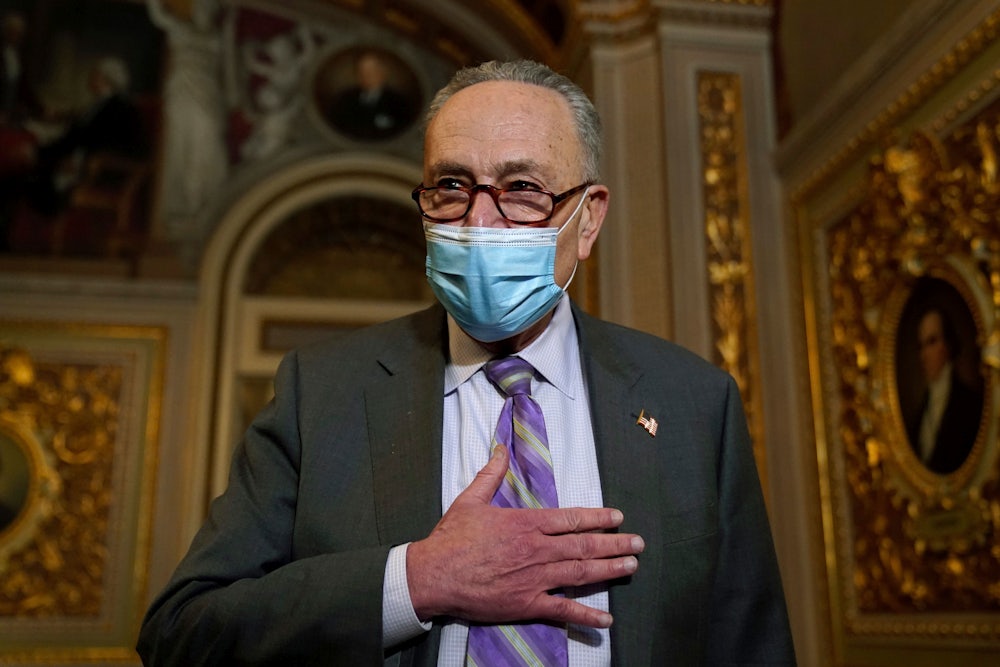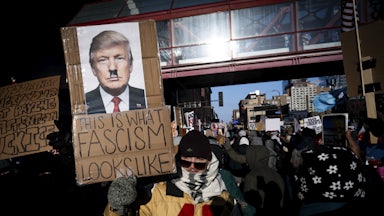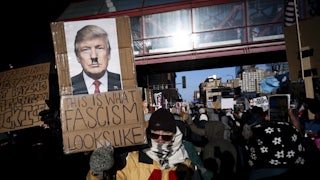The second impeachment trial of Donald Trump ended with a whimper Saturday afternoon, leaving time for the long weekend in honor of, yes, presidents. And like a veteran mob boss who sneers at justice, Trump beat the rap again as his adversaries fell 10 votes short of the 67 needed for conviction.
Yes, there were small consolations. Seven Republican senators mustered the moxie to find Trump guilty of inciting an uprising that directly led to members of Congress and Vice President Mike Pence running for their lives. There were also lasting moments of eloquence from the House Democratic managers, particularly Jamie Raskin and Joe Neguse, even as Trump’s lead attorney, Michael van der Veen, a Philadelphia slip-and-fall lawyer, managed to humiliate himself at every turn, at one point even mispronouncing the name of his own hometown.
But what the last day of the impeachment trial will mostly be remembered for is Democratic disarray on the vital question of calling witnesses. As legendary baseball manager Casey Stengel said about the 1962 New York Mets, “Can’t anyone here play this game?” At times on Saturday, it seemed that Chuck Schumer and Company were as lost as a baseball team that blew 120 games.
The impeachment case should have been built around Trump’s state of mind as he did nothing to stop a fanatic mob of his supporters from sacking the Capitol. But in explaining his dereliction of duty, the House impeachment managers had to depend mostly on journalistic accounts that described Trump initially reveling in the violence, rather than on the firsthand testimony of people who witnessed his behavior.
Late Friday night, the smoking-gun evidence arrived in the form of a press statement from Representative Jaime Herrera Beutler, who was one of the 10 brave House Republicans who voted to impeach Trump. The six-term legislator from Washington State—presumably frustrated with the reluctance of Senate Democrats to call witnesses—recounted a conversation that House GOP leader Kevin McCarthy had described to her. In the midst of the assault on the Capitol, Trump told McCarthy, who had phoned to plead for assistance, “Well, Kevin, I guess these people are more upset about the election than you are.”
Nothing that had been released during the impeachment trial more dramatically conveyed Trump’s cheering for the bullyboys attacking the Capitol. A gallows had been erected on the grounds of the Capitol, and the marauders were searching for Pence, but the only thing that mattered to Donald J. Trump was overturning a free election that he had unequivocally lost.
Even though the Senate was expected to end the trial Saturday without calling any witnesses, Raskin surprised the world (and Senate Democrats) Saturday morning by requesting that Herrera Beutler be allowed to testify via Zoom. Van der Veen immediately threatened to call hundreds of witnesses himself and to take their depositions in his office in Philadelphia. (Somehow van der Veen was unaware that he could not unilaterally move the Capitol to Philadelphia.)
On a roll call, the Senate voted 55–45, as five Republicans joined with the Democrats to delay the end of the trial to hear witnesses. The Senate then recessed for private negotiations on how many witnesses would be called and on what timetable. When the trial was gaveled back into session, a deal was announced: Herrera Beutler’s press release would be read aloud and entered into the record.
That was it. Period. No live witnesses, no further investigations—just a rush to final statements and the vote.
Why did the Democrats cave after they had the votes for witnesses? The full answer will seep out over the next few days as reporting sheds additional light on the conversations among Senate Democrats. But there are tentative guesses.
Schumer, never one to take on quixotic causes, has obviously been worried that witnesses, subpoenas, and depositions would tie up the Senate for weeks. Behind the scenes, Joe Biden may share his concerns. The president has displayed scant willingness to share the limelight with Trump. Biden’s biggest priorities are the passage of his $1.9 trillion Covid-19 relief package and the confirmation of key appointees, such as attorney-general-in-waiting Merrick Garland.
But, because of a holiday recess, the Democrats had wiggle room on the legislative calendar, with the next nine days open for a continuation of the trial. The stimulus package is still working its way through House committees—and Nancy Pelosi’s optimistic schedule wouldn’t even send it to the Senate for another 10 days. Garland’s confirmation hearings are slated to begin on February 22. With the Senate Democrats able to formulate the rules for witnesses in an impeachment trial, it should have been possible to hear from an eager Herrera Beutler and a few others without jeopardizing Biden’s legislative agenda.
What may have been more sobering to Schumer and his colleagues was the threat that the Senate Republicans would retaliate to the decision to call witnesses by obstructing the Democratic agenda in the future. Yes, a cynic might wonder how Mitch McConnell could surpass himself in the obstruction department. But Iowa Republican Joni Ernst said the quiet part out loud Saturday morning when she told a reporter that calling witnesses would be “a total shit show.” She then warned the Democrats, “If they want to drag this out, we’ll drag it out. They won’t get their nominations. They won’t get anything.” In a Senate that often needs to run on unanimous consent, this was not an empty threat.
But the Democrats never asked themselves the obvious strategic question: Why were Republicans so afraid of witnesses, particularly GOP witnesses? No one, with the exception of van der Veen on his Fox News tryout, defended Trump’s conduct. Even a vaporous threat of Republicans at the barricades prompted Schumer to retreat. Part of that may reflect Schumer’s lack of passion for the cause that originated with the House Democrats. Part of it may have been simple miscommunication with the House managers. And part of it could have been Schumer’s skittishness over how to operate in a 50–50 Senate.
The Senate Democrats never fundamentally understood impeachment; they focused solely on the Republican votes that might be up for grabs. According to Politico, Chris Coons, a Delaware senator close to Biden, told the House managers, “The jury wants to vote. People want to get home for Valentine’s Day.” Coons staffers dispute aspects of this Valentine’s Day Massacre story. What is clear is that Coons and other key Senate Democrats assumed—probably correctly—that more evidence and a protracted trial would not change the Senate vote count or the certainty of Trump’s acquittal. So why bother?
But the impeachment trial was never about the outcome; it was about giving the American people a better understanding of Trump’s complicity and even joy in the attack on the Capitol. Witnesses would have provided a dramatic way to capture the attention of the more than 100 million voters who chose not to watch the trial this week. Just a three-minute news clip of Herrera Beutler telling the Kevin McCarthy story to the Senate would have had more emotional wallop than all the eloquence of the impeachment managers.
As it is, the swing voters, whom Democrats desperately need to hold the Congress in 2022 and resist a Trumpian restoration, were not tuning in to the trial. According to TV ratings, Thursday’s session of the trial attracted about 12 million viewers on cable and network television. That’s a number equal to about 8 percent of the votes cast in the 2020 presidential race. All indications are that most of the ardent viewers were already anti-Trump: MSNBC narrowly edged CNN on cable, with Fox News badly trailing.
Some Democrats will be disappointed that the Senate was unable to bar Trump from running for president in 2024. But, as alluring as a Trump-free political future would have been, keeping him off the ballot in 2024 might have had unintended consequences.
Legally banning Trump from higher office could have turned him into a martyr. Rather than defusing the authoritarian threat of Trump and his Proud Boy brigades, a blanket ban might have inflamed matters even further than they already are. Former United Nations ambassador Nikki Haley—a would-be 2024 candidate whose attitude toward Trump has always been a GOP weathervane—got close to the truth when she recently told Politico that Trump is already a spent force. As Haley put it, “I think he’s lost any sort of political viability he was going to have. I think he’s lost his social media, which meant the world to him.”
The impeachment vote could be seen as the opening salvo in a Republican civil war over Trumpism. The seven Republicans who voted to convict Trump include the stalwart Mitt Romney (the only GOP senator who said “guilty” the first time around); Susan Collins and Lisa Murkowski, the two women who pass as GOP moderates; Pat Toomey and Richard Burr, who are retiring in 2022; and Ben Sasse and Bill Cassidy, who don’t have to face the voters again until 2026.
The most intriguing—if typically cynical—performance was Senate GOP leader Mitch McConnell’s. After voting to acquit Trump on dubious constitutional grounds, McConnell then delivered a searing Senate speech. Referring to January 6, McConnell said, “There is no question—none—that President Trump is practically and morally responsible for provoking the events of the day.”
Of course, McConnell is partly responsible for aiding and abetting Trump for four years. But it is telling that at a moment of Trumpian triumph, he chose to speak in a way designed to defuse the skyrockets at Mar-a-Lago. McConnell’s calculus—and never doubt his abilities at political math—is that the benefits of breaking with Trump far outweigh the price of continued fealty. That and the seven Republican votes for conviction are the sole bright spots on a dispiriting Saturday.








